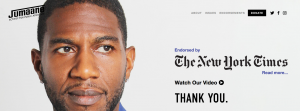By Austin Santiago
On Tuesday, Jumaane Williams, a councilmember representing Brooklyn’s 45th district in Central Brooklyn, was elected the new Public Advocate for New York City.
The victory was clear and certain, as Williams secured 33 percent of the votes cast for all 17 candidates in the special election, according to the Board of Elections.
Tuesday night, Williams was celebrating his victory at Cafe Omar in Flatbush, where he delivered an emotional victory speech. Although the evening was filled with celebration, the days before the election were filled with

questions about Williams’ fitness for office.
Two days before the election, the New York Daily News broke the news that Williams had been arrested in 2009. The reason: a dispute with his then girlfriend, who called the police.
Williams revisited the incident shortly after the news came out stating, “Over ten years ago, I had a verbal disagreement with my then partner. To bring down the volume, I left the apartment to pick up dinner for both of us, return, and let cooler heads prevail. When I got back, two officers were present , and per protocol at the time, an arrest was made.”
Following his arrest, Williams made one appearance in court, the charges were dropped, and the case sealed.Although Williams held his ground, he still questioned why such news came out so close to the election. “I still wonder why something that was dismissed and sealed, why that would be leaked?”
While Williams himself attributed the report to a perpetuation of black male stereotypes, the reason shows the impact the city’s newspapers have on city-wide elections.
The New York Daily News not only broke the news of Williams’ sealed arrest record, but the paper also published an editorial telling its readers to vote for Eric Ulrich, one of only two Republicans in the race.
The editors wrote: “We strongly urge voting for Eric Ulrich, Republican councilman from Queens. If he wins today’s contest, that will set up something closer to an actual election in this Democrat-dominated town: a crowded party primary to oppose him in June, a runoff if nobody tops 40%, and then a general election in November.”
Five days prior to the election, the New York Times published its editorial endorsing Williams. “He is the right person to fight for millions of New Yorkers frustrated with the city’s subways, struggling to find affordable housing in its neighborhoods, and waiting to have their voices heard,” the Times’ editors declared.
Hank Sheinkopf, a political consultant based in New York City, says one of those two editorials carried significantly more weight than the other.“The only endorsement that mattered was the New York Times,” he said. “The Times editorial directed the people who could not figure this [the election] out.”
However, when asked why a self-described populist newspaper like the Daily News would endorse a Republican in this heavily Democratic city, Sheinkopf said: “Newspapers are controlled by corporations . . . It was an attitudinal decision made by attitudinal people.”
When asked if The Daily News’ endorsement of Urlich had something to do with his support for the now-defunct Amazon deal, Sheinkopf answered simply: “It had something to do with it.” The bosses at the Daily News clearly preferred a politician who supported the Amazon deal, not someone who has spoken against it, the consultant concluded.
While many New Yorkers did not show great attention to this election, the press did cover it fairly steadily. By Sheinkopf’s reading of the late scenario, the Times helped Williams become the next Public Advocate, and the Daily News may very well have pushed Urlich into second place. The lesson to be learned is that the power of the press in New York City should never be taken lightly.

Leave a Reply
You must be logged in to post a comment.